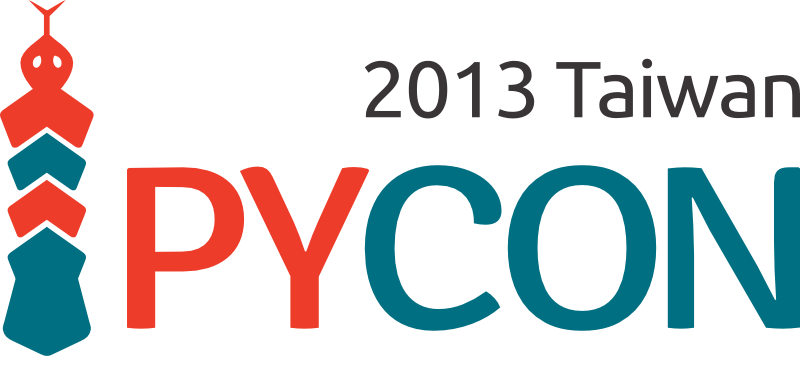

2013.05.26 by
PyHUG: Python Hsinchu User Group Meetup
Taipei.py: Python Taipei User Group Official Site
2013.05.22 by
PyCon Taiwan 2013 is coming. Are you ready for the event?
Before you come to the conference hall, there are a few things to remind you.
2013.05.16 by
We are making a difference in PyConTW this year. OK, we confess, it's actually just one of the many differences we are making.
There's a plan for a reception and performance in the first night.
You can host any unbelievable things like in a night market. So we call it a "bazaar"!
2013.05.14 by
Update: Slides from author
Working with Python has changed my way of thinking about programming from an activity of translation ---expressing an algorithm in code--- to an activity of thinking and creating. Where I used to write solutions in math notation and then translate to code, I increasingly find myself thinking in code, and thinking differently as a result.
In this talk I will start with some basic examples that demonstrate the expressive power of Python, and move on to examples from my recent work that prompted me to reflect on Python as a way of thinking---and what I half-jokingly call "the epistemology of programming".
Finally, I will talk briefly about the curious history of my introductory programming book, Think Python.
2013.05.14 by
In contemporary digital design, the desired behavior is typically modeled using a Hardware Description Language (HDL). An HDL is characterized by a number of hardware-oriented features, such as support for massive concurrency, built-in determinism, and bit-level types. The most widely used HDLs are Verilog and VHDL.
MyHDL is a Python library that turns Python into an HDL. This has the tremendous advantage that it opens the Python ecosystem to hardware designers. MyHDL users directly benefit from Python's ease of use, descriptive power, and extensive libraries. Moreover, MyHDL brings modern techniques such as agile development to the hardware design world.
In this talk, the design of the MyHDL library will be explained. Topics include the modeling of concurrency using generators and decorators, and the type system. Moreover, a brief description of a number of industrial projects will illustrate the practical benefits of MyHDL.
2013.05.08 by
I'll talk about some common misconceptions with scaling engineering infrastructure. Specifically I will focus on things to avoid early on, what I see as a successful strategy for a growing company, and where you can get some easy wins. Additionally I'll cover various high level components of an early scaling strategy such as database sharding, CDN caching, and overall architecture to simplify the growing pains.
2013.04.29 by
Python 3 is the future of Python. In this talk, I'll talk about why you should use it to make the next great thing. (I could say more about what I have in mind, but it would ruin the surprise.)
2013.04.26 by
We have decided to postpone the deadline of Early Bird registration...
2013.04.14 by
Everybody Pays is one of the principles of PyCon Taiwan. The financial aid program is to help people who have financial difficulties to join PyCon Taiwan.
2013.03.18 by
Jan Decaluwe is an expert and entrepreneur in electronic design and electronic design automation (EDA). He has been working in the field for more than 25 years. He co-founded Easics, a design services company, and Sigasi, a company that makes productivity tools for VHDL design. In the Python community, Jan is known as the creator of MyHDL, an open source Python-based hardware description language (HDL).
2013.03.08 by
David Cramer is the author of many open source libraries and tools and has been active in the Django and Python communities for more than 6 years. He is the author of Sentry (an open source error aggregator), and previously lead the infrastructure team at Disqus where he helped grow the system to nearly a billion unique visitors a month. At present he works for tenXer, a new startup dedicated to measuring your daily performance and identifying ways that you can be more productive in whatever you do.
2013.03.07 by
David Beazley is a well-known hacker in the Python community, the author of Python Cookbook and Python Essential Reference, and the original developer of Swig (http://www.swig.org/). He has been programming computers of various sorts for more than 30 years. David first came across Python in 1996 when he was writing high-performance software for supercomputers. He developed Swig to help add scripting language interfaces to scientific software. Today, this is mainstream practice, but in 1998 it was still a radical idea. Although being a die-hard C programmer, David uses Python for doing just about everything that would be annoyingly tedious to do in C. By the way, the forthcoming third edition of Python Cookbook will be in print by 25th May, the day you meet the author in PyCon Taiwan.
2013.01.31 by
PyCon Taiwan is a unique community event. While we are working hard to boost up the quality, we also do everything we can to avoid a simple gathering meeting. Therefore, we design every activity around the axis of "creating value".
2012.11.21 by
PyCon Taiwan 2013 is now accepting all types of proposals.